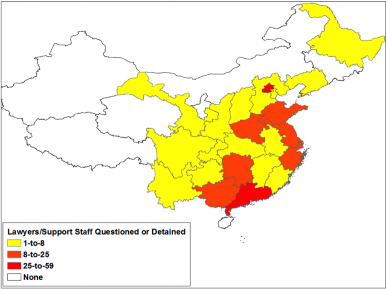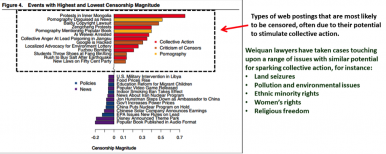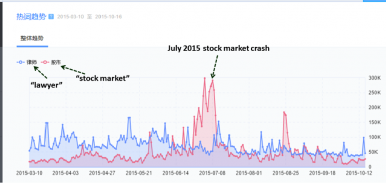China’s leaders are keen historians, particularly when it comes to events that drained political power from authoritarian rulers. The Magna Carta, which established for the first time the principle that all, including the king, were subject to legal restraints on the exercise of power, is one such event. This marked a pivotal moment in world history and the document’s message still clearly disturbs China’s leaders more than 800 years after its issuance. Indeed, consider the abrupt and unexplained cancellation of a public display of one of the actual surviving Magna Carta originals at Renmin University in early October 2015. To that end, the Party leaders seek to forestall a Chinese “Magna Carta Moment,” in part by curtailing the activities of China’s rights lawyers (“weiquan lushi”), who seek to uphold the rights of individuals against the arbitrary or improper exercise of state power.
In Beijing’s mind, allowing these lawyers to operate freely could risk eventually establishing a new social contract under which the power of the Party should be subjugated to the force of an independent rule of law. Governments naturally seek to minimize potential constraints on their exercise of power. And this is precisely why Beijing is striking hard against the rights lawyers. In July and August of 2015, police interrogated and/or detained nearly 300 rights lawyers and their support staff, across 24 provinces and administrative areas. Beijing led the way, with 17 persons detained and 42 others interrogated and/or travel restricted (Exhibit 1).
Exhibit 1: China Rights Lawyer Detention Map (July 2015- 2 October 2015)
Source: China Human Rights Lawyers Concern Group, Author’s analysis
In short, the current crackdown reflects Beijing’s deep-seated fear that rule of law could become a rallying point for broader collective action against the power of the Party State. The July 2015 stock market plunge may also be amplifying the desire of President Xi Jinping and his inner circle to curtail rights lawyering. Judicial decisions that better define individuals’ rights vis-à-vis the state could eventually coalesce into another macro force which, like financial markets, can become too powerful for the government to easily manipulate.
The government’s attempts to break and discredit the rights lawyering movement reflect a deep, palpable fear that rule of law could eventually supplant the “rule by man” which has characterized China’s political system for millennia. The country has a long bureaucratic tradition under which day-to-day activities were governed by laws and codes. Yet decisions at the top of the political structure derived legitimacy from the “Mandate of Heaven.” Chinese emperors were never constrained by a body of law the way that England’s rulers were subject to the Magna Carta or the way many modern leaders must yield to the national constitution and court system. The Communist Party operates in a similar fashion, with the Party effectively existing “above the law.” Indeed, recent clarifications to CPC internal discipline procedures explicitly highlight the need to keep Party rules distinct from the “regular” Chinese legal system.
Beijing’s fear of rights lawyers also shares a common trait with China’s vast Internet censorship program: the desire to suppress and constrain any type of activities which could spark collective action. Unsurprisingly, there are not any official statements which clearly state the motivations for detaining weiquan lawyers. Nonetheless, an innovative study of China’s internet censorship program by Professor Gary King and his research team at Harvard University sheds light on the matter. During the first half of 2011, King and his team downloaded social media posts from nearly 1,400 Chinese websites, ultimately collecting and analyzing more than 11 million discrete posts.
What King and his team found was striking: The most highly censored events were not criticisms of the Chinese government, but rather, events or ideas that had a high potential for stimulating group formation or collective action. For instance, posts about protests in Inner Mongolia, protests by angry migrant workers in Zengcheng, and anger about local lead poisoning of children in Jiangsu were intensively censored (Exhibit 2).
Exhibit 2: Conceptual Relationship Between Internet Censorship and Repression of Rights Lawyers
Source: King et. al., Author’s Analysis
King’s groundbreaking research provides illuminating context as to why the Chinese government is cracking down on the rights lawyers. These lawyers are not “traditional” run-of-the-mill dissidents. Rather, they are much more dangerous in Beijing’s eyes because they not only fight for principles, but are clever advocates who (1) use the law, an institution that transcends their personal views and can yield a concrete, precedent-setting outcome and (2) are often skilled at organizing and rallying support, and (3) they receive significant – and likely increasing – attention in Chinese society. Consider for instance that on the popular microblog Sino Weibo, the keyword “lawyer” has generally trended above the word for “stock market” for much of the past seven months (Exhibit 3).
Exhibit 3: Significant Interest in Lawyers on Key Chinese Social Media
Source: Sino Weibo Index, Author’s Analysis
While not definitive, the Sino Weibo data strongly suggest that the role of lawyers is becoming more deeply embedded in the social consciousness of China’s social media users. This is an important development, as Sino Weibo’s more than 175 million active monthly users tend to be highly educated, with more than 70 percent reportedly holding at least a bachelor’s degree. Weibo’s user base is heavily drawn from China’s Millenials. Unlike their parents, they were not scarred by the terrible turmoil of the Cultural Revolution and may be significantly more open to individualist rule of law ideas. But Beijing is not eager to put this hypothesis to the test and prefers trying to nip the nascent rights lawyering movement in the bud.
The crackdown on rights lawyers sets up an interesting situation. Chinese courts’ civil caseload has basically doubled since 2004 as businesses take to the courts to resolve contract disputes and other matters, with courts accepting more than 9 million civil cases in 2014 according to data from the Supreme People’s Court. Yet citizen suits against government agencies and officials (so called “民告官” cases) have faced much tougher times recently, with the average victory rate for plaintiffs falling from roughly 30 percent a decade ago, to only about 10 percent nationwide as of 2014, and as low as 2 percent in some provinces, according to local sources.
Lower success rates in citizens’ lawsuits against state entities and personnel likely stem from several related factors. First, the line has clearly hardened against rights advocates who use the law to challenge state/Party power. Second, judges are sensitive to such shifts in the political wind and are likely adjusting rulings accordingly. Third, it is likely that many prospective legal advocates who would otherwise be willing to take cases involving land seizures, religious repression, and other hot button rights issues are thinking twice as they watch the government systematically chop down those lawyers who have displayed the courage to take on the state.
Business Law and Rights Lawyering: Crossing Paths
There is clearly an emerging dichotomy between business law and rights law. Beijing accepts courts adjudicating business disputes, yet arrests, harasses, and disbars prominent rights lawyers. But can such a split sustainably co-exist? PRC citizens will likely increasingly ask the simple, but loaded question: “Why can I sue for redress in a business deal where I was wronged, but cannot use the courts to seek compensation for my land being taken by a developer working hand in glove with the local government or to establish the right to freely worship?”
If more “economic rights” type cases creep into the Chinese business courts, the government’s intolerance of lawyers seen as representing “rights” interests could face an interesting test. Consider for instance sophisticated assertions of something akin to what we would call a “takings” claim resulting from condemnation of land in the path of highway development or new regulatory rules that affect an investor’s project.
These types of cases on their face appear to be business cases, but in reality, involve the defense of individual (or at least “non state”) property interests against various degrees of state infringement. If such cases begin to be decided – particularly if any attain the status of “guiding cases” – then the doors begin to open for a creative rights lawyer to claim that if the law protects individuals’ business and economic interests, why can’t that protection be extended to other spheres as well? Even if attempts to make such claims in court are initially squelched by the government, once the idea is out, it is likely to be contagious.
Much of the Chinese civil court docket currently comes from contract disputes, family property disputes, and intellectual property cases. But as the range of cases evolves and expands, courts and the Party may clash as judges seek to continue the courts’ professional evolution while the Party seeks to control adjudications that could reinforce citizens’ subscription to rule of law ideas that might threaten the Party’s grip on power. Thought leaders such as Zhou Qiang, president of the Supreme People’s Court, clearly seek to improve public trust in the courts and setting forth “guiding cases” and a system of more predictable principles for judicial decisions is a major step toward accomplishing this important goal.
Lawyers are likely to play an important role in this process, but will do so differently than they would in an Anglo-American common law system. Common law systems emphasize argumentative and persuasion skills that few private or corporate litigants possess in sufficient measure to handle a case themselves. But systems in which documents and simpler factual presentation of evidence are the core of the persuasive process, the need for legal counsel could diminish.
With respect to China, this author believes that for more complex civil disputes involving personal rights questions, the ability to hire legal counsel is very important to help litigants navigate often unfamiliar judicial processes. And so the potential for lawyers and the Party to collide will, if anything, increase in coming years as the courts’ business docket diversifies. To that point, the civil courts have arguably gained sufficient inertia that “censoring” the courts by trying to keep certain types of cases off their business dockets is rapidly becoming unacceptably disruptive—particularly as firms and businesspeople seek “official” ways to resolve disputes, lest they be caught in President Xi’s anti-corruption dragnet.
As the Party cracks down on rights lawyers fighting for individuals, it may not appreciate how the civil courts’ growing adjudication of personal and corporate economic disputes may be gradually creating a much more robust foundation for individual rights claims a few years in the future. Business case decisions adjudicating economic rights are planting seeds in the collective knowledge base that may eventually lay the foundations for the very “Magna Carta Moment” that Beijing so deeply fears.
Gabe Collins is a licensed Texas attorney and expert on energy, natural resource, security, and governance issues. He is the Co-Founder of China SignPost and has worked as a Research Fellow at the US Naval War College’s China Maritime Studies Institute and as a private sector commodity investment analyst.




































